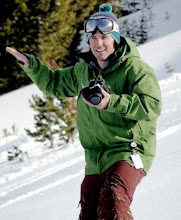Note: before this text I was talking about a dark epiphany in "The Wreck of the Deutschland." A nun cries out for god but dies anyway.
Of course in true Hopkins' fashion the Nun dies anyway in the wreck causing one to question God because he has forsaken her and her devotion like Simon Peter or a traitor on Tarpeian Rock. But its all part of the Epiphany though sometimes dark and confusing. BUT...
Loathed for a love men knew in them, | |
| Banned by the land of their birth, | |
| Rhine refused them. Thames would ruin them; | |
| Surf, snow, river and earth | |
| Gnashed: but thou art above, thou Orion of light; | 165 |
| Thy unchancelling poising palms were weighing the worth, | |
| Thou martyr-master: in thy sight | |
| Storm flakes were scroll-leaved flowers, lily showers—sweet heaven was astrew in them. | |
22 Five! the finding and sake | |
| And cipher of suffering Christ. | 170 |
| Mark, the mark is of man’s make | |
| And the word of it Sacrificed. | |
| But he scores it in scarlet himself on his own bespoken, | |
| Before-time-taken, dearest prizèd and priced— | |
| Stigma, signal, cinquefoil token | 175 |
| For lettering of the lamb’s fleece, ruddying of the rose-flake. |
Hello St. John of the Cross! The nuns must suffer to reach salvation they must experience "the dark night of the soul". They must endure the tumultuous waters and ultimately, drown, as a gift to the "martyr-master" (God I think). But God grants them peace and a happy ending (at least thats how I interpret it) as "sweet heaven was astrew in them (the nuns that is)." This is where I think the poem gets real interesting, what they must endure is likened to the suffering of Christ and what they must endure, a "Mark, the mark is of man's make." It seems to me that the suffering endured by the Nuns during the shipwreck or better yet, "the dark night of the soul," is mans creation (probably the only one in Hopkins' view), it is a self inflicted wound most likely originating from Bible World History Episode 1...The Apple. More interestingly, though man created his own suffering, man doesn't have the power to instill the "thingness" of the suffering. That is up to God he must manifest the "inscape" of the suffering, he must breath "the word of it Sacrificed." Which means we have the power to discover the "instress" of the "inscape" of our own creation... suffering. Wow... my head hurts.
From what we have read in Eliot, I think it is safe to say he would agree with Hopkins' view of epiphany. God made the epiphany, it was his gift to man but the dark epiphany (i.e. suffering and sacrifice) was man's own creation and man doomed himself to a hell of a lot more dark epiphanies than light ones. I think he would also agree that a real good epiphany (the ultimate AWE!!!!) comes from the "instress" of suffering (or dark epiphany). Though I would imagine Eliot would use a bit of different wording "The only hope, or else dispair, Lies in the choice of pyre or pyre-- To be redeemed from fire by fire"

No comments:
Post a Comment